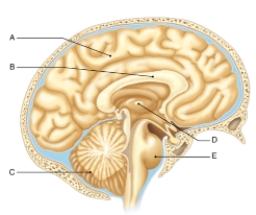A) thyroid-stimulating hormone (TSH)
B) prolactin (PRL)
C) growth hormone (GH)
D) adrenocorticotropic hormone (ACTH)
E) antidiuretic hormone (ADH)
G) A) and C)
Correct Answer

verified
Correct Answer
verified
Multiple Choice
When the level of adrenal cortex hormones is low due to hyposecretion, a person develops which of the following disorders?
A) Cushing syndrome
B) exophthalmos
C) Graves disease
D) Addison disease
E) diabetes mellitus
G) A) and E)
Correct Answer

verified
D
Correct Answer
verified
Multiple Choice
A patient's pons has been affected by a rapidly growing tumor. Of the choices listed below, which is the most likely result?
A) loss of the normal breathing rhythm
B) hearing loss
C) inability to understand speech
D) inability to regulate blood pressure
E) inability to experience emotions
G) A) and E)
Correct Answer

verified
Correct Answer
verified
Multiple Choice
Which of these receives sensory input from the eyes, ears, joints, and skeletal muscles about the present position of body parts?
A) thalamus
B) amygdala
C) hypothalamus
D) hippocampus
E) cerebellum
G) A) and D)
Correct Answer

verified
Correct Answer
verified
Multiple Choice
Which type of neuron is completely contained within the central nervous system?
A) sensory neuron
B) motor neuron
C) autonomic neuron
D) interneuron
E) sympathetic neuron
G) A) and D)
Correct Answer

verified
Correct Answer
verified
Multiple Choice
Degenerating neurons surrounded by clusters of abnormal tissue, especially in the hippocampus and amygdala, accompanied by progressive memory loss is typical of
A) Alzheimer disease.
B) Parkinson disease.
C) Graves disease.
D) Addison disease.
E) Cushing syndrome.
G) All of the above
Correct Answer

verified
Correct Answer
verified
Multiple Choice
If an individual's pancreatic islets have been destroyed, the result will be
A) Cushing syndrome.
B) Graves disease.
C) type 2 diabetes mellitus.
D) Addison disease.
E) type 1 diabetes mellitus.
G) C) and D)
Correct Answer

verified
E
Correct Answer
verified
Multiple Choice
Which of the following describes how drugs can affect the nervous system?
A) Drugs can enhance the release of a neurotransmitter.
B) Drugs can block the release of a neurotransmitter.
C) Drugs can block the receptor for a neurotransmitter.
D) Drugs can mimic the actions of a neurotransmitter.
E) All of these statements describe how drugs can affect the nervous system.
G) A) and D)
Correct Answer

verified
Correct Answer
verified
Multiple Choice
A spinal nerve contains
A) axons of sensory neurons only.
B) myelinated axons only.
C) axons of motor neurons only.
D) dendrites only.
E) both sensory and motor axons.
G) A) and B)
Correct Answer

verified
Correct Answer
verified
Multiple Choice
Which hormone stimulates milk letdown?
A) prolactin (PRL)
B) luteinizing hormone (LH)
C) oxytocin
D) follicle-stimulating hormone (FSH)
E) estrogen
G) A) and E)
Correct Answer

verified
Correct Answer
verified
Multiple Choice
Which hormone helps to maintain your blood glucose level between breakfast and lunch?
A) insulin
B) glucagon
C) parathyroid hormone (PTH)
D) thyroxine
E) epinephrine
G) A) and C)
Correct Answer

verified
Correct Answer
verified
Multiple Choice
The exophthalmos seen in Graves disease results from hypersecretion of the
A) thyroid gland.
B) parathyroid glands.
C) posterior pituitary.
D) adrenal cortex.
E) pancreas.
G) A) and C)
Correct Answer

verified
Correct Answer
verified
Multiple Choice
Which two hormones are produced by the adrenal medulla?
A) aldosterone and cortisol
B) acetylcholine and norepinephrine
C) luteinizing hormone and follicle-stimulating hormone
D) antidiuretic hormone and oxytocin
E) epinephrine and norepinephrine
G) A) and B)
Correct Answer

verified
Correct Answer
verified
Multiple Choice
Long, myelinated nerve fibers are called _____ in the PNS and _____ in the CNS.
A) tracts; nuclei
B) nerves; ganglia
C) ganglia; nuclei
D) nerves; tracts
E) ganglia; tracts
G) A) and D)
Correct Answer

verified
Correct Answer
verified
Multiple Choice
Which of these is a second messenger?
A) cAMP
B) ATP
C) a peptide hormone
D) a steroid hormone
E) DNA
G) A) and B)
Correct Answer

verified
Correct Answer
verified
Multiple Choice
_____ hormones can pass through the plasma membrane of a target cell.
A) Second messenger
B) Steroid
C) First messenger
D) Peptide
E) DNA
G) B) and E)
Correct Answer

verified
B
Correct Answer
verified
Multiple Choice
The hormone _____ lowers blood glucose, while the hormone _____ raises blood glucose.
A) insulin; glucagon
B) epinephrine; norepinephrine
C) cortisol; insulin
D) thyroxine; glucagon
E) glucagon; insulin
G) A) and C)
Correct Answer

verified
Correct Answer
verified
Multiple Choice
Consuming alcohol increases the need to urinate. This is due to the inhibitory effect of alcohol on
A) antidiuretic hormone (ADH) .
B) adrenocorticotropic hormone (ACTH) .
C) parathyroid hormone (PTH) .
D) epinephrine.
E) norepinephrine.
G) All of the above
Correct Answer

verified
Correct Answer
verified
Multiple Choice
Which of these structures is the pons? 
A) A
B) B
C) C
D) D
E) E
G) A) and E)
Correct Answer

verified
Correct Answer
verified
Multiple Choice
The hormonal secretion(s) of the _____ serve to increase the body's metabolic rate.
A) thyroid gland
B) adrenal medulla
C) adrenal cortex
D) posterior pituitary
E) parathyroid glands
G) A) and C)
Correct Answer

verified
Correct Answer
verified
Showing 1 - 20 of 54
Related Exams